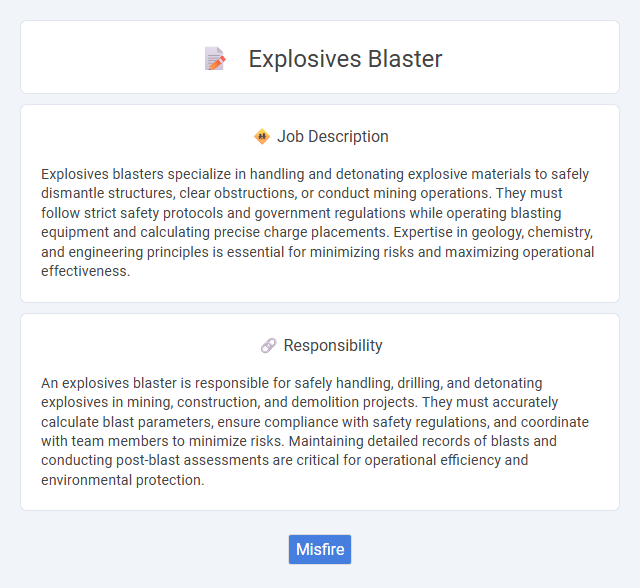
Explosives blasters specialize in handling and detonating explosive materials to safely dismantle structures, clear obstructions, or conduct mining operations. They must follow strict safety protocols and government regulations while operating blasting equipment and calculating precise charge placements. Expertise in geology, chemistry, and engineering principles is essential for minimizing risks and maximizing operational effectiveness.
Individuals with strong physical fitness and high stress tolerance are likely to be suitable for a job as an explosives blaster, given the demanding nature of handling volatile materials and operating heavy machinery. Those prone to anxiety or with respiratory or heart conditions may face significant health risks, making this occupation potentially unsuitable. A careful assessment of mental resilience and physical health is probably crucial for determining suitability in this role.
Qualification
Explosives blaster jobs require candidates to hold certifications such as the Occupational Safety and Health Administration (OSHA) blaster qualification and a valid state blaster license. Proficiency in handling various types of explosives, knowledge of safety protocols, and experience in controlled blasting techniques are essential. Strong understanding of geological formations, precise measurement skills, and training in risk assessment further enhance job readiness for this high-responsibility role.
Responsibility
An explosives blaster is responsible for safely handling, drilling, and detonating explosives in mining, construction, and demolition projects. They must accurately calculate blast parameters, ensure compliance with safety regulations, and coordinate with team members to minimize risks. Maintaining detailed records of blasts and conducting post-blast assessments are critical for operational efficiency and environmental protection.
Benefit
A job as an explosives blaster likely offers competitive salaries due to the high-risk nature of the work and specialized skills required. There is a probable demand in industries such as mining, construction, and demolition, potentially providing stable employment opportunities. The role may also offer valuable experience in handling advanced technologies and safety protocols, which could enhance career growth prospects.
Challenge
The explosives blaster job likely involves managing high-risk environments where precision and safety are paramount, making decision-making under pressure a constant challenge. Workers may frequently face unpredictable conditions that require quick adaptability and thorough knowledge of explosive materials to minimize hazards. The complexity of coordination with team members and adherence to strict regulations can increase the difficulty of successfully completing blasting operations.
Career Advancement
Explosives blasters possess specialized skills in handling and detonating explosives for construction, mining, and demolition projects, leading to opportunities in project management or safety supervision roles. Gaining certifications in blasting techniques and safety regulations enhances job prospects and eligibility for senior positions such as Chief Blaster or Blasting Supervisor. Experienced blasters can transition into consultancy roles, providing expertise on blast design and compliance, which offers higher earning potential and career growth.
Key Terms
Misfire
Explosives blasters must strictly follow safety protocols to handle misfires, which occur when an explosive charge fails to detonate as intended. Immediate procedures include ceasing all operations in the blast area, notifying the supervisory team, and allowing a designated wait time before safely inspecting the charge. Proper training in misfire response reduces the risk of injury and ensures the controlled and secure disposal or reloading of the explosive device.
 kuljobs.com
kuljobs.com